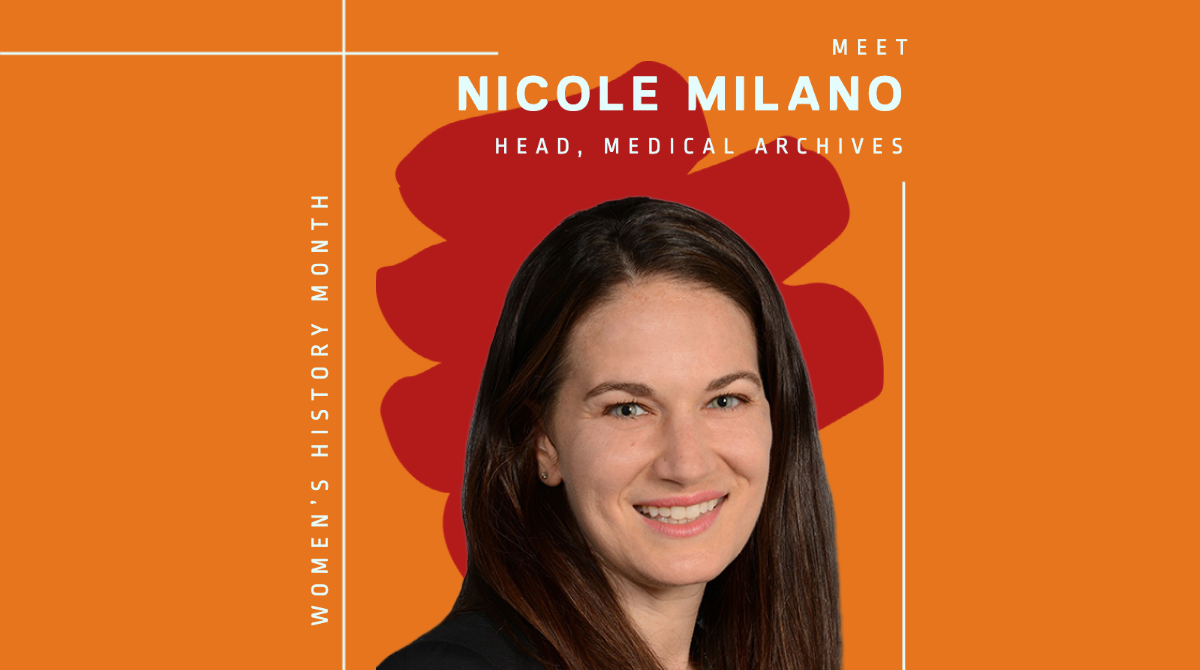
Perched on the 25th Floor of NYP's Baker Building, the NewYork-Presbyterian/Weill Cornell Medical Center Archives preserve and grant access to a vast archival collection documenting the history of the hospital and medical college. At the helm is Nicole Milano, who brings her passion for archival work to the WCM community with an array of outreach initiatives and fascinating projects that preserve and illuminate the past of Weill Cornell, and carry it into the future.
In your own words, what is your role in the Library?
I oversee the archival repository that preserves and creates accessibility to the more than 250-year history of the NewYork-Presbyterian/Weill Cornell Medical Center.
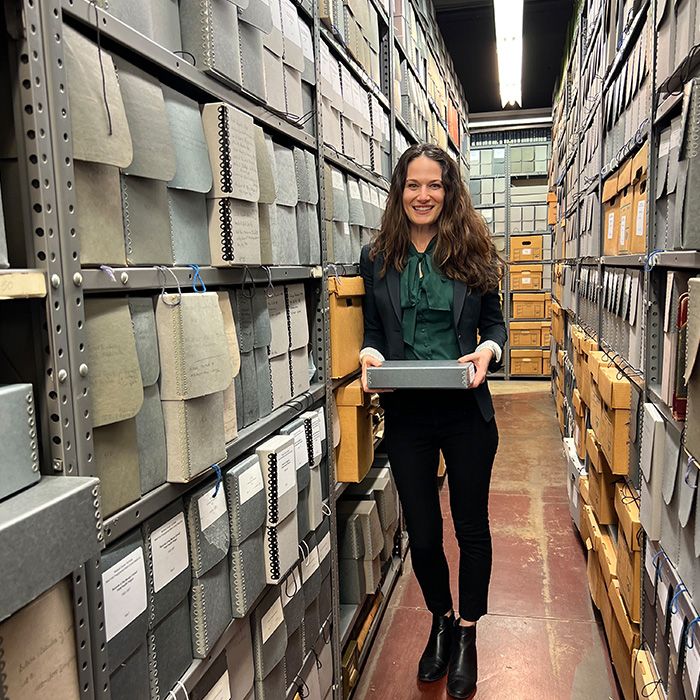
What's your favorite part about your job?
There's a lot, but I would say outreach is definitely one of my favorite parts! “Outreach” in my role essentially means bringing the archival collections to students, faculty, staff, and the general public in ways that help them understand what we have in the archives, and also how they can use the archives for a variety of projects.
For example, we have a collection of late 19th and early 20th century records related to the Lying-In hospital, which document not only the medical treatment of patients, but also provide fascinating details ranging from the patient’s country of origin to their place of employment. These records amplify the story of women and their reproductive health, demonstrating the distribution of healthcare and reflecting the rapidly-changing demographics as waves of immigration were changing New York City itself, particularly after the opening of Ellis Island in 1892. These records can be used for so many research purposes from showing how medical care changed over time to demonstrating demographic changes in New York City, as just two examples. We include information about the Lying-In Hospital in our “Stories from the Archives” tour, by the way, for anyone who wants to learn more!
In the past four years we've significantly increased our outreach activities in the Archives. We started or expanded things like virtual and onsite tours on a regular basis (including a popular fall-themed tour and the quarterly “Stories from the Archives” I just mentioned (shout out to Greg Chopp, by the way, for his role in this!) an annual book club focusing on the history of medicine with the Library and Office of Diversity and Inclusion, showcasing original artifacts at the annual SmartFest, teaching a session on archival research and the history of the medical center in the Essential Principals of Medicine course for first year medical students, and expanding the visibility of the Heberden Society history of medicine lecture series.
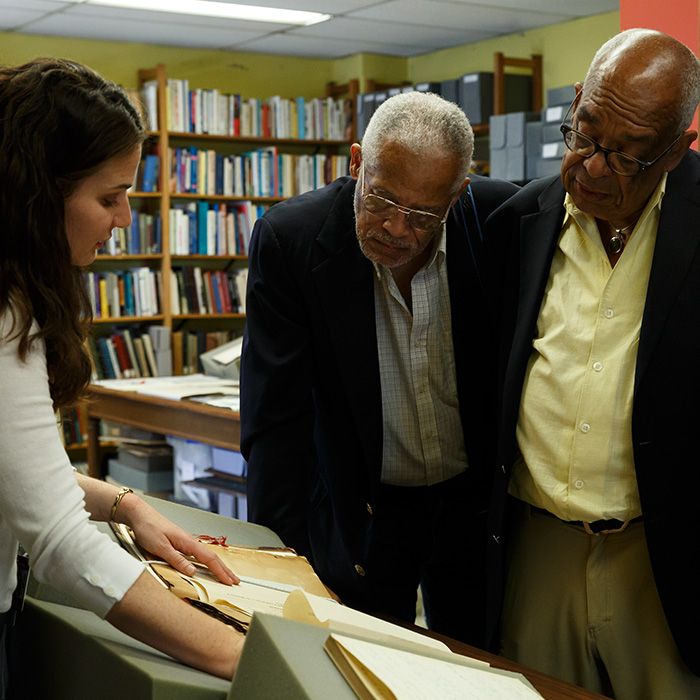
On an archives tour with the family of Roscoe C. Giles, the first Black graduate of WCM in 1915
Can you remind us where the Archives are?
We are located on the 25th floor of the historic Baker building.
How many years have you been with the library?
I've been in the position of Head of the Medical Center Archives since August 2018. It feels like time blurred together during the pandemic so it’s hard to believe I’m coming up on five years!
And what were you doing before you joined Weill Cornell?
Out of graduate school, I was a fellow in the Princeton University Archives, processing archival material and curating an exhibition on John F. Kennedy’s brief stint as a Princetonian. They have some amazing collections, like Michelle Obama's thesis, and I learned so much from their brilliant archivists. After that I worked at a nonprofit student exchange and intercultural learning organization as their archivist for a number of years. I loved that organization- it was created by volunteers who served as ambulance drivers overseas during World Wars I and II. After witnessing the devastation of both World Wars, they came back to the US and wanted to create an organization dedicated to peace- what a beautiful concept, right? I felt lucky to meet some of the wartime ambulance drivers who played a role in the creation of the current organization, and have the opportunity to preserve and create accessibility to their stories.
What does it mean to be an archivist?
Being an archivist means that you are preserving the unique documentation typically of an organization, a person, or a specific topic. There's a range of different types of archives, from government institutions (like the National Archives, which we've been hearing quite a bit about recently) to corporations (Disney World has an archive, for example.)
So, here at Weill Cornell, we preserve the unique institutional records of both NewYork-Presbyterian Hospital at our medical center and Weill Cornell Medicine, papers of people who have been affiliated with the institution over time, and predecessor institutions (like the Lying-In Hospital I mentioned earlier). For example, this includes the records of institutions founded by Elizabeth Blackwell, who was the first female to receive an MD in the United States in 1849. She and her younger sister, Emily (who was the third woman in the US to earn an MD), started a medical college in 1868 dedicated to training women, since it was so hard for them to get accepted into the predominantly male medical schools at the time. All of the women from that program came to Weill Cornell (then known as Cornell University Medical College) in 1898 when it was created. And the hospital the Blackwell sisters created in 1857 is now Lower Manhattan Hospital! These records are a fairly new acquisition for us, which we were thrilled to receive.
Not only do we collect archival material, but we preserve it and try to ensure that it lasts for future generations. This is format-neutral, by the way. We preserve everything from parchment charters from the 18th century, to VHS tapes from the 1980s, all the way up to born-digital records created during the COVID-19 pandemic.
So you're continually taking in material?
All the time. It's our role to collect and preserve it, but then we also want to make it available to others. That's one of the primary reasons we're here. People come on site from all over the world to use our collections and conduct research. Or they’ll contact us via e-mail if they have questions. For example, we have a documentary film team that we're assisting right now. Museums borrow material from our collections for exhibitions. And we also have people within the institution that use our collections all the time, like medical students or faculty who are doing their own research. We love being able to help them with the many different projects they come up with.
What are examples of initiatives you're working on to improve the Weill Cornell Medicine community?
Definitely outreach- the initiatives I mentioned before help the Weill Cornell Medicine community in a variety of ways- but I'm also excited about some more behind-the-scenes projects that our team is working on that are maybe less glamorous, but are dedicated to the core of what we do.
This includes better intellectual management of our historical collections, assessing opportunities for improved environmental controls in our space, and developing a new infrastructure for digital preservation and access. We know that a lot of records that we're getting now and in the future will be born digital, so we need to make sure that we have the system to really support and preserve those moving forward. And then finally, we've been dedicated to diversifying the archival record and ensuring that our historical collections better represent the many voices who have been a part of the story of this institution. This involves a number of collection-related initiatives , but also an incredible oral history project led by a current medical student, Pauline Flaum-Dunoyer. She's interviewing women of color at the medical center, transcribing the interviews, and donating it all to the Medical Center Archives.
What a cool final project
Yea, I’m a little biased but I think Pauline and her project are really great.
So switching to something a little more personal, what has your experience been like as we've adjusted to remote work, although as you mentioned, you're coming in pretty regularly now.
We're hybrid employees in the Medical Center Archives. We split our time between on-site and remote work. I was the only faculty member in the Archives during the height of the pandemic, so I actually started coming back on site in the summer of 2020 on a regular basis.
Was there anyone else in the office?
It was really just me in terms of full-time faculty in the Archives during that period. I wasn’t coming in every day, but when I did come in I was definitely traveling in on the subway with my gloves and mask and visor and everything else at the time, trying to stay as far away from the other people as possible.
Now I love having the flexibility of a hybrid schedule. Being home allows me to avoid a long 2-hour round trip commute, and I'm also able to focus on core projects . Much of my work can be done remotely but at the same time, I appreciate coming on site several days a week to work directly with the analog archival material and interact with researchers and members of the WCM community in person. It's really nice to see your coworkers in person!
And actually, even when we were still social distancing and not coming on site on the same days, my colleagues and I would make things and leave them in our shared fridge for the next person to find. We all went through a homemade ice cream phase back in the summer of 2021, which was great. We should probably revive that, that was good.
What keeps you inspired and motivated?
It feels a little cliche to say that the people I work with keep me inspired and motivated, but I mean it. As I mentioned earlier, I was the only faculty member in the Archives during the height of the pandemic, so now I’m thrilled to not only have one but two archival colleagues. It's been wonderful to brainstorm about new projects with Tali Han, the Technical Services Archivist, and Amanda Garfunkel, the Digital Archivist. They're creative and smart and a lot of fun to work with. And of course I love working for an organization with a mission I believe in. Our work contributes to an organization dedicated to saving and improving lives. That's incredible to be even a small part of! And finally, I have a strong passion for archival work in general. I really believe in the value of archives and that understanding the good and bad from our past helps us move forward more productively as a society.
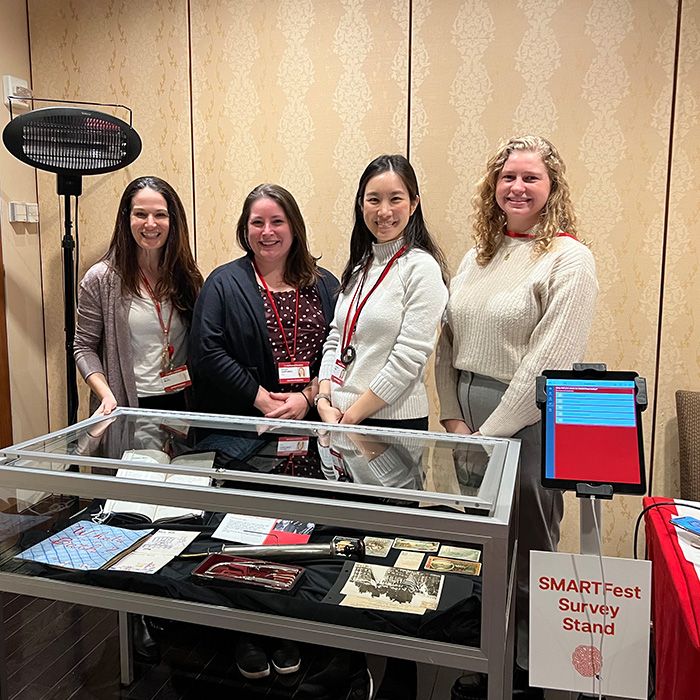
The Medical Center Archives team at SMARTFest
Who are some women you admire?
While I do admire some of the more obvious famous choices, the women I know personally I admire even more. Frankly, women have been operating in an unequal society for generations and despite the best efforts of those who came before us, we are still struggling to break the glass ceiling, achieve parental leave for all, and have equal access to abortion rights, among so many other things. The list goes on. So I'm just amazed at the persistence and drive of the women who came before me and had it even harder than we do today. I watch my family and friends and colleagues in amazement as they do things ranging from pushing for pay equity, to taking care of elderly family members on top of their work responsibilities, to something as seemingly simple as struggling to find a space to pump breast milk for their baby at a conference.
The woman I admire the most in my life continues to be my mom, who passed away when I was in high school. The lessons she taught me in the all-too-brief 16 years I had with her, I still carry with me to this day. She was resilient, compassionate, loving, intelligent, funny. Honestly, the best mother I could have imagined! I'm so flattered when anyone tells me I remind them of her. It’s the highest compliment I could ever receive. She was also an animal rights activist and taught me to stand up for what is right, even if it isn't easy.
What do you like to do outside of work?
I'm very involved in my professional archival organizations. I also teach a graduate course in the Department of History at NYU in the Fall semester.
Outside of professional things, I would say most of my free time right now involves running after my 17-month-old son. He's somehow undoing many of the baby proofing efforts that we've implemented. But he's also just, you know, the cutest baby in the world (in my totally unbiased opinion- ha!) And he's so funny. He makes us laugh all the time.
I also enjoy traveling and hiking and cooking and eating- I'm Italian American, after all, the cooking and eating parts are sort of in my blood. I’m an avid Duolingo user on my subway commute. I'm trying to polish my super-rusty Italian skills from when I was an au-pair in Rome after college, and also trying to learn Norwegian so I can speak more fluently to my husband's family. Ønsk meg lykke til! ("Wish me luck" in Norwegian).
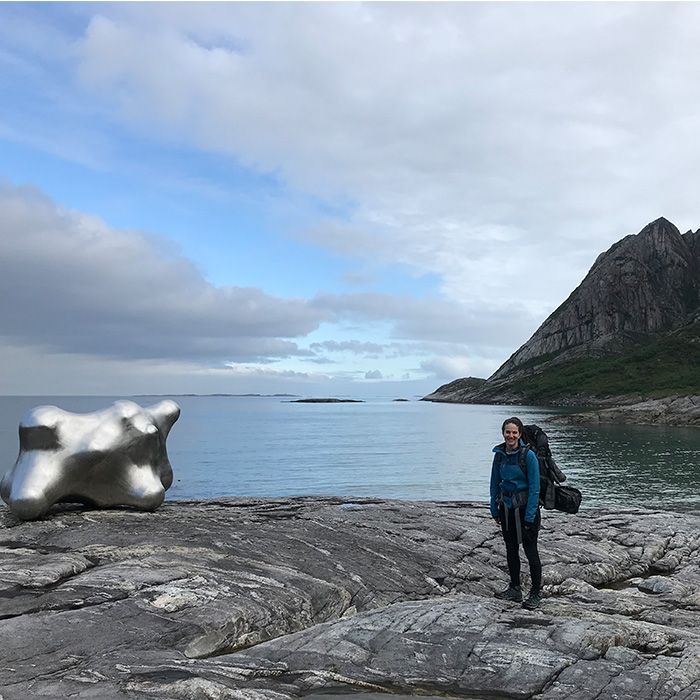 Hiking on RØdØya, Norway
Hiking on RØdØya, Norway

